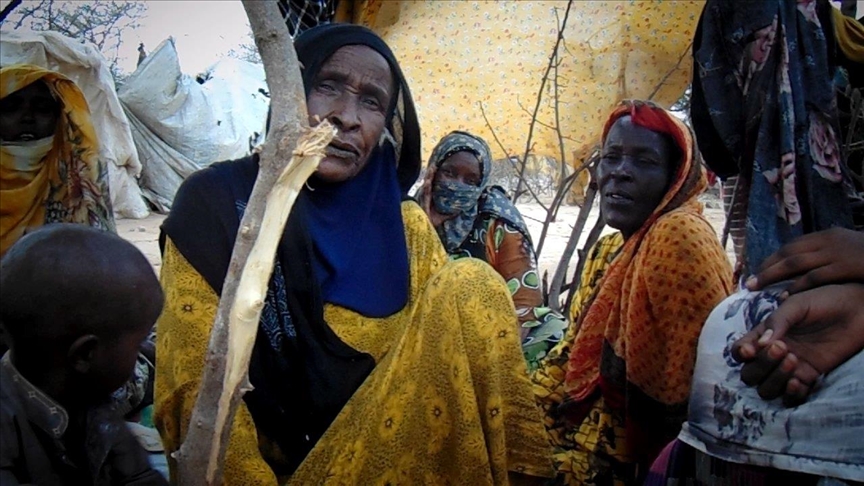Sexual violence in conflict: ‘Terrifying to be a woman in Sudan right now’
Dozens of rape cases reported since war erupted in mid-April but many survivors not coming forward, lack of medical aid compounding misery, say rights groups
 ( Abdoulaye Adoum Mahamat - Anadolu Agency )
( Abdoulaye Adoum Mahamat - Anadolu Agency )
ISTANBUL
In a neighborhood in northern Khartoum, a group of paramilitary soldiers broke into a house and raped a woman while they held her husband at gunpoint.
They also raped other women in the house, all of them refugees from Eritrea.
In another area of Khartoum, two women were violently dragged out of a bus at a check post manned by soldiers of the Rapid Support Forces (RSF). They were then locked up in a storage area and raped.
Hala al-Karib, an activist and researcher from Sudan, has more such harrowing accounts of women who have fallen prey to rampant sexual violence since the war between the army and the RSF erupted in mid-April.
“It’s terrifying to be a woman at the moment in Sudan,” al-Karib told Anadolu in a conversation ahead of the International Day for the Elimination of Sexual Violence in Conflict, marked globally every year on June 19.
Al-Karib, regional director of the Strategic Initiative for Women in the Horn of Africa, said the group has documented at least 59 cases so far – 35 in Khartoum and 24 in South Darfur.
The actual number is bound to be higher, since many survivors are hesitant to come forward, she said.
“There is a large number of sexual violence cases. Some (survivors) do not want to speak about it. Some felt that they would rather go in hiding. Very few have elaborated on what has happened to them,” she said.
Now in its third month, the war in Sudan has claimed more than 1,000 lives, displaced over 2 million people, and left nearly 20 million in a catastrophic humanitarian situation, according to the UN, which has also said that reports of gender-based violence, including sexual violence, are increasing.
Rape and sexual violence has been perpetrated by soldiers in homes, on roads, and even refugee camps.
Survivors range from girls as young as 14 to women as old as 50. One reported rape case involved three sisters, one of whom had just given birth.
Once a case is reported, the priority for al-Karib and her team is to relocate the survivor to a safe place.
“We immediately remove the survivor from the location where the rape occurred. Otherwise, it wouldn’t stop,” she said.
For instance, she said a South Sudanese man working as a security guard in Khartoum told her that 25 women in his family had been “systematically” assaulted.
‘Long history of sexual violence’
Activists and organizations in Sudan say sexual violence has been pervasive in the country’s long history of conflicts, particularly blaming the RSF.
The RSF and the Sudanese military have both accused each other of carrying out such atrocities.
“The RSF militia has a long history of using sexual violence as a weapon of war. They have done that for the past 20 years in Darfur,” says al-Karib, adding that their crimes have also been documented by the International Criminal Court.
Zero accountability of the perpetrators, inside the country or externally, has allowed sexual violence to remain rampant in Sudan, especially in Darfur, she said.
Al-Karib said rape is used as a weapon in conflicts to “dehumanize women and break communities.”
“It’s about that power and breaking communities who are under attack. It’s about destroying the social and cultural fabric,” she said.
A lack of commitment by the international community and governments to prosecute perpetrators of sexual violence only emboldens them, she added.
No medical aid for survivors
Given the security situation in Sudan and the collapse of healthcare facilities facing continuous attacks, survivors of sexual violence are left with almost no medical assistance.
Only 20% of hospitals in Khartoum are still functioning, while the vast majority of medical facilities in Darfur have been forced to shut down, Alyona Synenko, regional spokesperson for Africa with the International Committee of the Red Cross, told Anadolu.
“How are the victims going to receive the support that they need? Usually it would be health centers and health facilities that would be receiving these women and providing them medical or psychological support,” she said.
The current situation is such that even the hospitals that are open do not have electricity, clean water, and other essential supplies, Synenko explained.
“So, this is extremely concerning because to even get an accurate picture about the scale of sexual violence, you won’t get that from the hospitals,” she said.
Anadolu Agency website contains only a portion of the news stories offered to subscribers in the AA News Broadcasting System (HAS), and in summarized form. Please contact us for subscription options.







